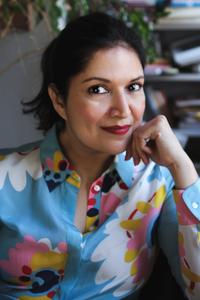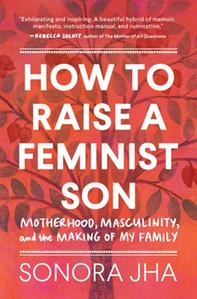
|
|
| photo: Ellie Kozlowski | |
A respected South Asian literary voice in the Pacific Northwest and a professor of journalism at Seattle University, Sonora Jha worked as journalist in India and Singapore before moving to the U.S. Her debut novel, Foreign (Random House India), was long-listed for the DSC Prize for South Asian Literature. Jha is a contributor to Alone Together: Love, Grief, and Comfort in the Time of Covid-19 (Central Avenue Publishing), an essay collection edited by Jennifer Haupt. How to Raise a Feminist Son: Motherhood, Masculinity, and the Making of My Family (Sasquatch Books, April 6), reviewed below, is Jha's gorgeously rendered, deeply intimate and inspirational account of nurturing in her Indian American son, Gibran, the critical values that will guide his life journey as a feminist ally.
Your goal, as you articulate with such elegance, was "to tailor a beautiful, sleek, custom-made, expandable, steeped-in-history, and yet timeless feminism" for your son. Is that work complete now that he is an adult?
The work of raising a feminist son is never quite complete. It just morphs into engaging his feminism. On the best days, it means enjoying his feminism and reaping its benefits, such as when he supports you or shows up for the women in his life. On the worst days, it involves challenging him to be a better feminist.
Empathy is the foundation for feminism in boys, as you point out. Does technology hinder the development of this critical trait in boys?
Not necessarily. Let's take social media, for instance. The #MeToo movement and the Black Lives Matter movement grew on social media and have spurred millennials and Gen Z youth to mobilize and fight for justice. On the other hand, some video games are horrifically misogynistic. It really depends on the conversations we are having with boys about their use of technology. As with other tools, we can use it for its better parts.
Your mother believed you to be a reincarnate of one of her heroes, Dr. Martin Luther King, Jr. That's a lot of pressure!
May we all be under such pressure, right? I imagine her grief over Dr. King's murder and her hope for his legacy to somehow be continued through her child. We can all do our tiny bit in the steps of that giant. The part of my mother that values social justice would like that.
As a child you were an avid reader of comics depicting stories of Hindu mythology and the mortal lives of gods and goddesses. What was it about these stories that so captured your imagination?
Mythology is so captivating, especially for a child. Those comics were so vividly illustrated. It was only later that I realized how darker-skinned characters were depicted as "marauders" and lighter-skinned ones as pure and good. Also, the men were muscular and the women sexy. The stories were about classic good versus evil, but the biggest draw was that these stories were really the only ones in comic-book form that represented Indian (mainly Hindu) culture, in the sea of Archie and Richie Rich comics we were inundated with.
 You describe the way Hindu goddesses created their male offspring, literally shaping them from turmeric, clay and sandalwood and raising them to be loyal. How does a parent's work in raising a feminist son parallel that of a mythological goddess?
You describe the way Hindu goddesses created their male offspring, literally shaping them from turmeric, clay and sandalwood and raising them to be loyal. How does a parent's work in raising a feminist son parallel that of a mythological goddess?
Shaping a feminist child, especially a feminist son, is not unlike Parvati shaping her child from her own skin and turmeric and clay and sandalwood. To raise a feminist son, let him know about the skin you're in--as a woman, a woman of color, a white woman. Talk about these things, talk about your dreams and aspirations and disappointments. Give him a sense of women's voice, their love, their anger, their power. Let him be witness and follower, not just a "leader." Teach him to be mindful and respectful of all of these.
How did South Asian cultural norms and practices inform your understanding of a mother's role?
I leaned into the parts that celebrate the love of motherhood. I call bullsh*t on the parts that exalt motherhood to some sort of higher status than those women who choose not to be mothers or are unable to be mothers. I also stepped away from the nonsense of "self-sacrificing" motherhood that South Asian cultures promote. I embraced a "self-actualizing" form of motherhood, where my mothering was just another aspect of my life, cherished and nurtured alongside my career, my love-life and my leisure. It's hard on some days, because we are so deeply conditioned into minimizing ourselves for our families and perhaps erasing ourselves for the benefit of our kids.
Are there Indian role models in popular culture for the feminist man?
I love the line in Monsoon Wedding in which the father figure played by Naseeruddin Shah says to the women in his family, "I will protect you even from myself." A few good depictions have come up in recent advertising, such as for Gillette in India. We're seeing movie stars like Ranveer Singh dressing beyond gender binaries. Some newer films show supportive male characters. But Indian popular culture is overwhelmingly sexist and misogynistic.
How to Raise a Feminist Son will be published in India a few weeks after its U.S. release. Do you expect it to change the conversation there for families raising boys? What is the state of feminism in India?
I sure hope it will contribute to the rich feminist conversation that's been ongoing in India. I have long said that some of the best feminists I know are in India. For the Indian edition, I spoke to feminists of different genders in India and also to Dalit and Muslim feminists--they are all advancing the feminist discourse so beautifully, and I hope my book, with its elements of memoir and manifesto, is a useful tool to them.
How to Raise a Feminist Son is profound and intimate, a true labor of love. What do you most hope readers will take away from it?
More than anything else, I want readers to enjoy the book. I want them to warm to the story, find beauty in the writing, and to find some hope in the insights I have shared. I want it to contribute to feminist theory and to the feminist conversation. And, I hope it helps others, especially South Asian women, to speak up, to speak out, to stop upholding the systems that make them live smaller lives.
You've lived in different parts of the world and various cities in the U.S. Where is "home"?
Seattle is home. I feel my strongest and kindest self here. It's filled with memories for this family of mine--my son and me. It's where my dog lives. It's home. --Shahina Piyarali, reviewer

